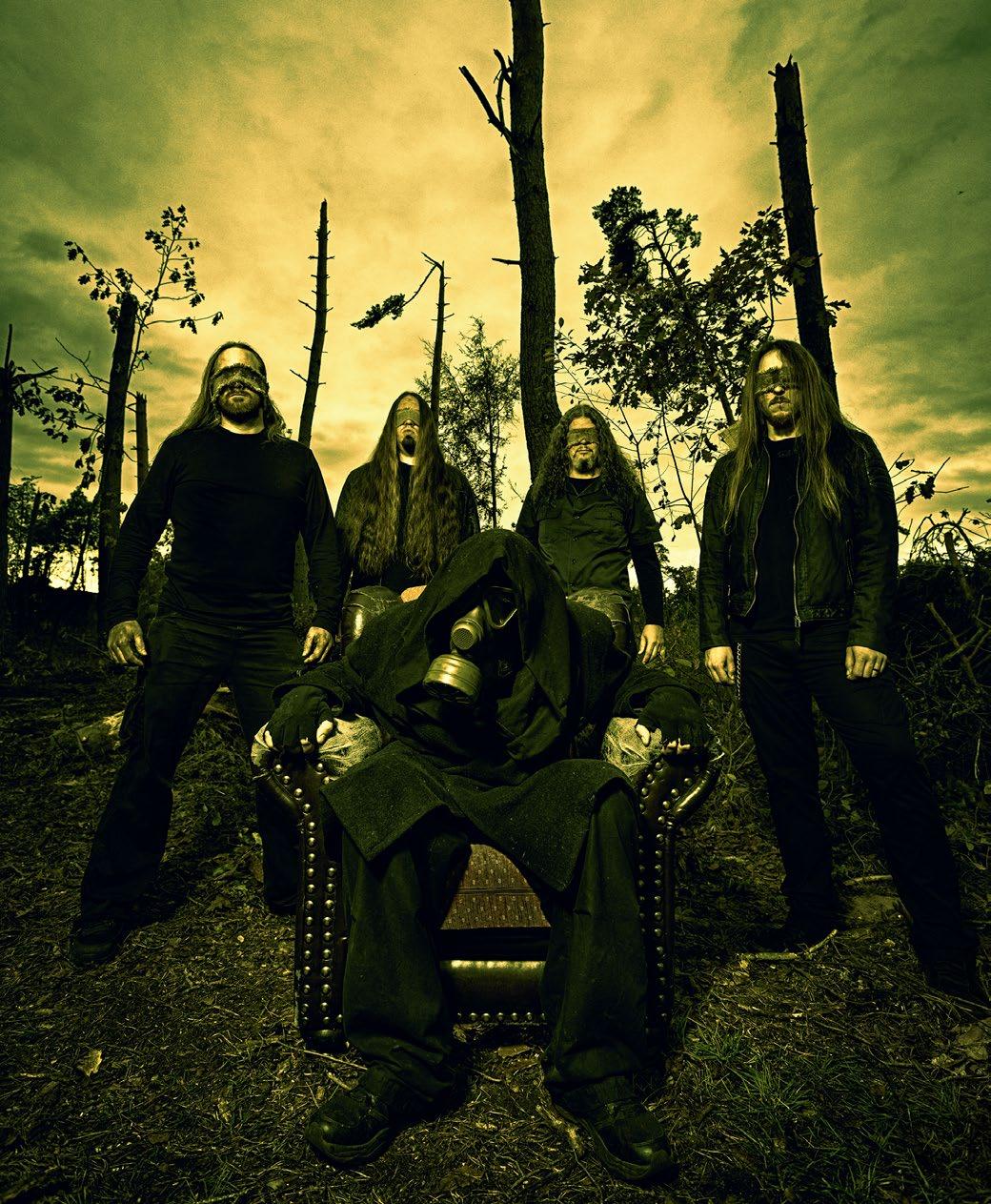
9 minute read
DISBELIEF
SONGS FOR END TIMES DISBELIEF INTERVIEW WITH SINGER KARSTEN “JAGGER” JAEGER BY ADDISON HERRON-WHEELER
Disbelief’s The Ground Collapses, out now via Listenable Records, is a record 30 years in the making. The German band have been at it for a while now, and recently came up with an album that sums up their sound perfectly.
Advertisement
“The sound on The Ground Collapses is growing again, in-between all our previous albums,” explains vocalist Karsten Jaeger. “We've worked together with the same studio as for the previous album, The Symbol of Death (Rambado Recordings). That's one of the reasons we've made the whole pre-production directly in-studio for the very first time in the history of Disbelief. This position was perfect for working out all the vocal stuff and to find the right guitar sound.”
The band take a more aggressive, brutal death metal direction with their guitar tone and their overall sound on this album, which they started working on in 2017. It’s a few years in the making, but more than a few years when you look back at all their previous efforts. They also channel at least 30 years’ worth of hate and destruction in their lyrics.
It’s the end of the world as we know it, and Total Fucking Destruction are feeling fine. At least, as well as can be expected. Although Rich Hoak, drummer and vocalist for the iconic grindcore trio, waxes poetic about end times, his vibe is resigned and cheerful, not morbid and despairing. “This album was an end of the world “Some songs are about hate (‘Killing to the Last,’ ‘Colder than Ice,’ ‘Hologram for the Scum’), what's going on when it controls you and makes you a different person who is able to do things, destroying, horrible things,” Jaeger says. “For other songs, I was inspired by Chernobyl, and get flashbacks to when it happened in real life when I was young. Then, there is the theme of suicide (‘The Waiting’).”
In addition to the dark themes on the album, Disbelief are feeling the weight of the dark time due to COVID-19 as they try and release a record.
“As a musician, it's hard to release a new album because of the fact that all planned shows were cancelled, and the shops have closed, so no one can buy the CD there,” adds Jaeger. “It feels like you’re ready to start a fight, but there’s no fight. This is very frustrating, but we’re prepared to strike back live when it’s possible again. We also played for the first time in the history of Disbelief a livestream show. We called it ‘The Virus Stream of Hell.’ It was very successful, and shows how thirsty fans are to watch and
TOTAL FUCKING DESTRUCTION INTERVIEW WITH DRUMMER AND SINGER RICH HOAK BY ADDISON HERRON-WHEELER
to listen to live music.” �� party because it's really the end of the world,” he explains about their latest record, aptly titled ...to be alive at the end of the world, out now via Translation Loss Records. “Other albums and songs we’ve written in the past have been sort of like predictions of how fucked up things are going to be in the future, and to my astonishment, things are even more fucked up than I ever thought they

would be, so that’s sort of where this album is coming from. I congratulate all the human beings on being alive to see the end of the world. That’s what the title track is about. I’m just astonished that the things I’ve written about have come true.”
As the record acknowledges the hardships the world has faced during the past 20 years, it’s also a celebration of the remarkably long time the band has been making music. Every member of the band has other bands under their belt, as well as a personal life, but they’ve also dedicated a considerable amount of time to Total Fucking Destruction. “I’ve never taken any lessons, and I don't read music or anything like that, but the lyrics and melodies I write often just appear in my head from somewhere,” Hoak says.
He claims that the album came about organically, from the timely decision to add their “Star Spangled Banner” cover as an ode to Jimi Hendrix to other songs they had written in advance of the official recording process. They also allowed themselves space to experiment with this recording.
“I’m not only interested in writing music that’s extremely fast or extremely heavy. I also like music that is extremely light, extreme in other ways,” Hoak adds. “All the songs on the album are extreme in some way, just not necessarily extreme grind.”
As for the musical arc of the record, it starts off with a congratulations about being alive and the end of the world and ends with a sort of question: Is the star spangled banner still waving? Is any of this still relevant? And even though it may well be the end of the world, the album
signs off with a question, a call to action. “Despite the fact that it’s the American national anthem, we want to speak to all those people who are oppressed by their governments. We want them to question that authority, and to question what's going on.” ��
THE POWER OF POSITIVE SONGWRITING FIRE IN THE RADIO INTERVIEW WITH GUITARISTS / SINGER JON MILLER AND RICH CARBONE BY ADDISON HERRON-WHEELER
In a time of darkness and depression, Fire in the Radio present a new album, Monuments, out now via Wednesday Records. The band’s dark, brooding blend of emo, grunge, and rock all lead to the distinct sound on this record.
“For a little more than a year, we’ve had over two dozen tracks that Jon [Miller, guitar and vocals] and I have been kind of going back and forth on, as well as the rest of the band, circulating the ideas and seeing what was sticking and what was pushing the envelope forward, particularly with this release,” explains vocalist and guitarist Rich Carbone. “We really wanted to achieve a blend of all of our influences and what we bring to the table. This time we brought in a producer, and it was great, because he was able to be very honest and give us feedback as we went along about what was working and what wasn’t.”
Hailing from Philadelphia, the band recorded in New Jersey, and were able to dial W hat is the world you want to see? Is it possible to shift one’s perspective just enough to remake the world to match what you want to see? It sounds impossible – and the start of just about every utopian disaster ever – but that’s because we’re always focused on the big picture. On their recently released debut full-length, Glacier Veins wrestle with smaller questions, ones of gratitude, small joys, and tweaks in perception. It doesn’t hurt that as a package, The World You Want to See, out down to the heart of their tracks and allow them to evolve. As they fleshed out the music, they also told a compelling and timely story with the lyrics.
“With the lyrics, we were working out where we are in this country, and noting that many of the value systems people have held have sort of faded over time,” says Miller. “We were basically trying to capture the idea that people can be like monuments, like a testament to what they believe in. And we don’t need that sort of dated value system to tell us where to go. I think it’s about embracing this sort of hopeful message of change, that we can push back against things, collectively.
The album also has themes of depression, personal struggle, and relationships. There are themes all over the map, but the unifying message behind the record is the power of the human spirit to push through, a very

PHOTO BY JESSICA FLYNN
GLACIER VEINS INTERVIEW WITH SINGER / GUITARIST MALIA ENDRES BY NICHOLAS SENIOR
important message right now.�� now via Equal Vision/Common Ground Collective, will make every listener’s ears very grateful.
There’s just something special about the Portland group’s dream punk – brushes of shoegaze, post-hardcore, pop-punk and dream pop are the musical colors Glacier Veins play with. It’s like a best of compilation of the past 15 years of alternative, but with the opposite lyrical approach. Vocalist and guitarist Malia Endres highlights where this mindset came from and how it’s evolved. “I’m not saying that everything is perfect if you just tell yourself it is, but I do believe that how content we feel in our lives and how much happiness we experience depends on how we perceive the things that go on in our lives. There was a positive shift in my life when I began noticing small joys and expressing gratitude for even the most simple things, and when I became comfortable with the idea that all of the events in my life are bringing me to the place where I’m supposed to

be. The songs on the album are a combination of my excitement for this way to view the world, and my own process of working through experiences in order to understand their purpose and grow from it.”
There’s a grounded element to the band, and that’s how musically tight and refined this is, especially for a first outing. That’s all by design, as Endres notes, “I started Glacier Veins with the intent of making it my forever music project. Writing songs is my emotional outlet, so I feel super connected to the songs I write. By starting Glacier Veins, I wanted to make sure that the songs I was writing wouldn’t be part of a project that had the possibility of the band breaking up and having to walk away from those songs. I wanted to have a project that I could continue to play under, regardless of members coming in and out of the band. I’m super grateful to have found Tyler, Kyle, and Jason through everything. Despite how the project started, the four of us are Glacier Veins. Our similarities and differences in music tastes really allow us to write and play well together and creatively.”
Musically, the vibe continues to the effervescent tunes. “We wanted people to be able to feel the emotion in the music,” Endres says. “Some songs are for feeling good and getting excited. Other songs are for feeling the heaviness of certain situations. I love music that makes me want to groove, so that comes out in the music I write, just because it’s what I would want to hear. All four of us were excited to bring in our own tastes to each song, so it was nice to find the sound for this record through a combination of our different musical interests.” ��










